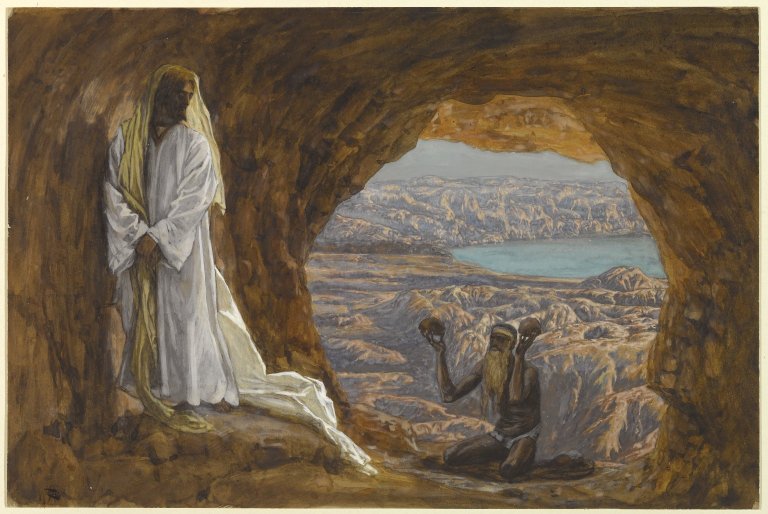First Sunday of Lent

https://genebrooks.blogspot.com/2012/01/luke-41-13-jesus-temptation.html
Today’s Reflection
Gospel: Lk 4:1-13
March 6, 2022 | Sunday
Jesus was now full of the Holy Spirit. As he returned from the Jordan, the Spirit led him into the desert, where he was tempted by the devil for forty days. He did not eat anything during that time, and at the end he was hungry. The devil then said to him, “If you are the Son of God, tell this stone to turn into bread.” But Jesus answered, “Scripture says: People cannot live on bread alone.”
Then the devil took him up to a high place, and showed him, in a flash, all the nations of the world. And he said to Jesus, “I can give you power over all the nations; and their wealth will be yours; for power and wealth have been delivered to me; and I give them to whom I wish. All this will be yours, provided you worship me.” But Jesus replied, “Scripture says: You shall worship the Lord your God and serve him alone.”
Then the devil took him up to Jerusalem, and set him on the highest wall of the temple; and he said, “If you are God’s Son, throw yourself down from here; for it is written: God will order his angels to take care of you; and again: They will hold you in their hands, lest you hurt your foot on the stones.” But Jesus replied, “It is written: You shall not challenge the Lord your God.”
When the devil had exhausted every way of tempting Jesus, he left him, to return another time.
Today’s Reflection: (by Fr. Lazaro N. Ervite, OSA)
In his opus “The Art of War” (c. 5th BCE), Sun Tzu—a Chinese military strategist—underscores that winning in any battle lies greatly on knowing oneself and one’s enemies. No less than the Lord Jesus applies such a strategy in dealing with the devil in the Gospel Reading.
Jesus is deeply aware of his identity as the Son of God and of his mission as the Messiah. The devil’s first and third temptations aim at making Jesus cast doubt on his identity. In the first temptation, the devil asks the famished Jesus to prove his Divine Sonship by turning a stone into a loaf of bread. This is hardly resistible for the famished Jesus. Not having eaten for forty days, he could have thought nothing else but food at that moment. Knowing the bad intention of the devil, however, Jesus refuses to do so and tells the devil that one does not live by bread alone (Lk 4:3-4). In the third temptation, the devil challenges Jesus to throw himself down from the pinnacle of the temple because the angels will come to his rescue if he is indeed the Son of God. Jesus escapes the trap by telling the devil that he will in no way put God to the test (Lk 4:9-12).
Moreover, Jesus deeply values what his identity as the Messiah entails. In the second temptation, the devil offers Jesus the authority over the kingdoms of the world through which he can swiftly liberate the Jewish people from the oppressive Roman Empire. Jesus, however, embraces his Messianic mission that entails ushering in liberation not through political and military might but through the promotion of the Kingdom of God (Lk 4:5-8).
The devil’s strategy is quite striking. He backs up his deceptive offers to Jesus by quoting from the Jewish Scriptures, which are grouped into three parts on the basis of authority and importance: (1) the Law, (2) the Prophets, and (3) the Writings. In tempting Jesus, the devil quotes from the Psalms (91:11-12), which belongs to the Writings—the third in rank in terms of authority and importance. Jesus counters by quoting from Deuteronomy (6:13, 16; 10:20), which belongs to the Law—the most important and authoritative in the Jewish canon. No wonder the devil gives up after his third attempt. Jesus knows the Scriptures better.
Jesus illustrates how we may overcome or at least manage our own tests or temptations in life. Firstly, we must know and accept ourselves. This is suggested in the First Reading in which the Israelites are exhorted to know their identity better by remembering their collective story. All of us have our own story which we ought to call to mind so as to know ourselves better and wholeheartedly accept both our good and bad qualities. In this Season of Lent, we are especially invited to go to a “wilderness” or a secluded place where we can observe silence and pray. Doing so on the regular basis enables us to know ourselves deeper. Once we know our strengths and weaknesses, we shall become more equipped in handling threats or tests in life. Hopefully we can identity and make the most of the opportunities that often go along the threats.
Secondly, we must know our enemies—a task that is far more challenging than knowing ourselves. The Greek word for devil “diabolos” (διάβολος) offers us a bird’s eye view on the identity of our enemy. Diabolos, which comes from two words: “dia” “across” and “ballo” (throw away), refers in a way to that which causes disintegration, division, and disunity. We must thus beware of and study closely whatever undermines our humanity and whatever causes division in the community. /Vulnerasti, 2022



